- Home
- Michael Dobbs
Churchill's Hour Page 6
Churchill's Hour Read online
Page 6
‘Public opinion can be a most demanding mistress.’ He did not mean it kindly.
And so they continued, the Englishman and the American, confronting each other, testing each other’s ideas, trying to find common ground but discovering their ambitions were as far apart as the continents from which they came. Churchill rose to his feet, his passion too great to remain seated, and he stood by the pale light of the window, his hand on his brow. It was what he had feared. Roosevelt wouldn’t move, not even an inch. He looked through the window and saw only disaster. If war broke out in the Far East, Britain would lose it, and the shockwaves of defeat would quite overturn Britain’s little boat. It would be the end, but he dare not admit it.
‘What will you do?’ Winant asked.
‘KBO, I suppose,’ Churchill muttered, his jaw jutting forward. ‘Just KBO.’
Winant was taken aback, not knowing what to do or say and having no idea what the old man was talking about.
The moment was broken by the arrival in the room of a young woman. It was Sarah, Churchill’s daughter, who had been visiting her mother. Winant rose, looking strangely like a schoolboy once more, the composure of recent moments vanished as Churchill made the introduction. She was tall, elegant, with a broad, open forehead and Churchill’s blue eyes.
‘Forgive the interruption, Papa,’ she said, kissing his cheek, ‘I’ve come to say goodbye. May I see you at the weekend?’
‘You shall!’ he said, dragging himself back from his broken dreams. ‘And Mr Winant here, too.’ He turned to the American. ‘Gil, you will be our guest at Chequers. You are one of the family now.’
Winant stumbled in reply, wondering if he were being asked merely out of politeness and not wishing to intrude. Sarah rescued him, reaching out to touch his sleeve. ‘Papa won’t take no for an answer,’ she told him. ‘He never does.’
To Winant she seemed delicate, a little fragile, and desperately appealing. And then she was gone.
Sawyers was hovering at the door. Behind him a pair of generals and an air vice-marshal were impatiently waiting their turn. ‘Time for me to go, too,’ Winant said. ‘You’ve work to do. A war to wage.’
Churchill stood and extended his hand. ‘I’m grateful for your candour, Gil. I know that’s what the President wants, it’s also what I want. No barriers between us, to hell with the diplomatic niceties. I pray we shall always be as straight with each other as brothers.’
Sawyers escorted the ambassador out. On the way to the door he gave the American a potted history of the old house. He also pointed to some of the features that had been added more recently—reception rooms that were badly damaged, windows broken and blocked up, great holes in the ancient plaster on the ceiling.
‘In all honesty, Your Excellence, Number Ten’s not exactly what yer might call a substantial house. George Downing was a bit of a bad ‘un, like. Built the street wi’out foundations.’
‘What happened to him?’
‘I believe he went to America, zur,’ the valet replied, leading him through the hallway.
As the great black door opened, it revealed a day growing dark and starting to spit with rain. Sawyers produced the American’s coat and hat, both of which had been given a stiff brushing.
‘Tell me, Sawyers, what does “KBO” mean?’ the ambassador asked as Sawyers helped him shrug into his coat.
‘Begging your pardon?’
‘“KBO.” He kept muttering it.’
‘Ah, it’s a military phrase, zur. From trenches in last war.’
‘Meaning?’
‘“Keep Buggering On.”’
‘Yes, of course it does,’ the American said, smiling. ‘You must find your job fascinating, Sawyers.’
‘I do find it has its moments, zur.’
‘An important job, too.’
‘Nowt special.’
‘But you are with him from morning to night. You see everyone and everything, on the way in and on the way out. I guess that makes you more important than the Lord Chief Justice and the Minister of War put together. And much better informed.’
‘Sadly not.’
‘Oh, and why is that?’
‘’Cos I’m by way of being too pig ignorant to understand or remember owt that’s said, zur.’
Winant looked nonplussed.
‘I’m quoting Mr Churchill, Your Excellence. Word fer word.’
Winant’s eyes danced with amusement.
‘We’re looking forward to seeing you at Chequers at weekend, zur,’ the valet continued as the ambassador stood on the doorstep, inspecting the weather. ‘But you’ll find it very English. Might I suggest that you put aside a particularly warm pair o’ pyjamas for the occasion? The central heating in’t up to what most American gentlemen seem to expect. I’m sure if Mr Roosevelt sends us any more American guests, we’ll have to ask him to send a new boiler along wi’ ‘em.’
The rain was growing heavier. The American pulled up his collar and scoured the sky. ‘Well, Sawyers, we’ll see what we can do. Tanks, battleships, bombers—and one new boiler. Lend-Lease at your service. Which reminds me, you will be getting another American soon, the man who’s coming to run the whole Lend-Lease show. Harriman. Averell Harriman’s his name.’
‘We look forward to meeting the gentleman. I’m sure he’ll be given a right warm welcome by Mr Churchill and the entire family. Night, Your Excellence.’
As the door closed behind him the ambassador, hat clamped firmly to his head, disappeared into the rapidly fading light. As he hurried through the drizzle, he wondered if Hitler knew that Downing Street appeared to be defended by nothing more than one unarmed policeman and an uppity servant.
She found him seated in an armchair by the fire in the Hawtrey Room, with Nelson asleep on his lap. It was late, almost midnight.
She hadn’t wanted to disturb him, but she knew of no one else who might understand, no one else who knew Randolph well enough—his recklessness, his passions, his appetites and ego, his moments as a little boy lost, all of which she had been able to tolerate and even welcome, until they had ended up smothering her in debt and left her bleeding on a bathroom floor.
He never turned her away, not like he did so many of the others. She seemed to occupy a special part in his world—so did Randolph, of course, but Pamela didn’t shout at him. And while his own elder daughters seemed to have inherited the ‘Black Dog’ of darkness that so often pursued him, Pamela was fun. Uninhibited. Almost a talisman. It wasn’t simply marriage and the baby, but a link that stretched back through the mists of time. Pamela had been born in the manor house at Minterne Magna in Dorset, which three centuries earlier had belonged to the Churchill family. The first Sir Winston Churchill had been born and was buried there. Links that bound them together from long ago.
He was studying the contents of a buff-coloured box. It was his box of secrets, in which Menzies and his intelligence men sent him their most sensitive items—his ‘golden eggs’, as he called them. She saw it and her heart sank. The papers came first. This was the wrong moment.
He looked up. She could see the rime of exhaustion clinging to his eyes before he returned to staring into the fire.
‘This morning, we shot a German spy,’ he said, very softly. ‘Parachuted in. Fell badly. The constabulary picked him up in less than three hours. And in less than three months we sat him in a chair, bound his arms and then his eyes, and proceeded to snuff out his life.’
She was surprised to see tears glinting in the firelight.
‘He was born in the same year as Randolph.’
‘He was a spy, Papa.’
‘He was a brave young man.’
‘A German. An enemy.’
‘And shall we shoot them all?’ He began stroking Nelson, staring into the fire. ‘When will it cease, Pamela? When shall we be able to return to the lives we once knew?’
‘Only when we have won.’
‘And, I fear, not even then.’ He seemed to be in pain. For many moments he sat si
lently, hurting, his mind elsewhere, seeking comfort from the cat.
‘Every night, before I fall asleep, I place myself before a court martial,’ he began again. ‘I force myself to stand trial, accuse myself of neglect. Have I done my duty? Have I done enough? Did all those men who died that day at my order give up their lives for sufficient reason, or did they die for nothing more than vanity?’
‘You know no man could do more.’
Churchill tapped the buff-coloured box. ‘Goebbels made a speech the other week. About me. I’ve just been reading it. Ever since Gallipoli, he said, Winston Churchill has spent a life wading through streams of English blood, defending a lifestyle that has outlived its time.’
‘He’s a liar. The blood has been spilled by Germans, not by you.’
‘But perhaps he has a point, you see.’ He held out his hand, summoning her close. She knelt at his feet.
‘The world in which I grew up and through which I have travelled all my life has outlived its time. My world is a world of Empire and Union Jacks, where the scarlet coat of the British soldier has stood proud and firm in every corner of the globe. Yet now…No matter what the outcome of this war, Pamela, that world is lost. The days of an atlas splashed in red, of emperors and adventure, of natives and majestic nabobs, they are all gone. Of another time.’
‘I don’t understand, Papa.’
‘After this war is over, whoever holds the reins of authority, it will not be Britain. We are too small, too content, perhaps even too kind. You need an edge of ruthlessness to rule. So whose creed shall we find in the ascendant? Hitler and his fascism? Commissar Stalin and his Bolshevist crusade? Or America, perhaps, which worships before the altar of Mammon? Which would you choose, Pamela?’
‘Why, America,’ she said uncertainly.
‘Better America, a thousand times better. Even though at times they totter around like blind men, especially when they set foot in other parts of the world. They don’t understand that all men are not as they are. And even when they stumble over the truth, they pick themselves up and carry on as if nothing has happened.’
‘But you have praised their generosity…’
‘Sometimes they are like gangsters.’
‘They have given us destroyers, Lend-Lease…’
‘In return for which they have taken all our gold and dollar reserves, demanded we give them military bases in every corner of the globe, and now their negotiators have started talking about handing over our art treasures and ancient manuscripts.’ His chin fell to his chest. ‘The bonfire of glories that once was the British Empire belongs to an age that has passed. That wretched man Goebbels was right. And so, in his way, was Randolph.’
‘Randolph?’
‘When Mr Roosevelt announced Lend-Lease, he likened it to lending a neighbour a hose pipe when his house catches on fire. You don’t quibble about its cost, so long as it’s returned. But Randolph says it’s more like offering a piece of used chewing gum, never expecting it to be returned.’
‘You act so warmly towards all the Americans…’
‘They are the New World, the young world. And I trust them as much as I would any seven-year-old. So we will douse them in flattery and humbuggery, and never give up hope that our American friends will find within themselves the will to fight the right war. But we can no longer rely on that.’
‘So what will you do?’
‘Do?’ For a moment he seemed to be searching for an answer in the flames. ‘I shall do whatever it takes. I gave Randolph my word. So tonight, and every night, as I stand before my court martial, I shall have to show that I have done something to ensure that Mr Roosevelt has pitched his tent a little nearer the sound of gunfire.’
She stroked his balding head, trying to bring him comfort, as though he were a young child. ‘What can I do, Papa?’
His eyes found her. ‘Do what only you can do, Pamela. Give me grandchildren. Give our family and our world a future. Make this all worthwhile.’ He kissed her hand. ‘What more can an old man ask?’
She had been right. This was not the time. She screamed, but only inside. He couldn’t know, didn’t deserve to be showered in the wretchedness that was welling up inside her. That would come later, when she was in bed, alone. He had so many other lives to care for; she would have to look after her own.
She left him staring into the embers of the dying fire.
FOUR
Spring. New life. Daffodils. Crocus. Blossom. Warmer days. Death.
The bombers were back. The intermittent raids of winter had given way to a renewed onslaught that pounded London night after night.
Queues. Britain’s way to win the war. Line after line of women waiting patiently for whatever was left. Hour after hour, without knowing what might be there when at last they came to the head of the queue, ration book in hand, coins in purse or pocket. The Ministry of Food had just announced five exhilarating new ways of serving potato—wartime ‘champ’, hot potato salad, potato pastry, potato suet crust. ‘And save those orange rinds,’ the official advertisement insisted. ‘Grate your orange peel and mix a little with mashed potatoes. The potatoes will turn an exciting pink colour!’
But would still be mashed potatoes.
Yet not everyone dined on pink mash. It was a foodstuff entirely unknown to Lady Emerald St John. In truth, her name was not Emerald—she had been born a Maud, but she thought it common. She was not a ‘proper’ lady, inasmuch as she was American and had married into the title, although she had parted from her husband many years previously, relieving him of not only his marital obligations but also a substantial chunk of his fortune. And, above all, Emerald was no saint. It was why people flocked to her dinner parties, always assured of entertainment, excitement, intrigue—and a little wickedness. Not sexual wickedness, Emerald had worn herself out on three husbands and was past most of that, but as the folds about her face had fallen to wrinkles, she compensated with a tongue that had developed the snagging capacity of a billhook. Sitting at one of her tables was like playing roulette with one’s reputation. Someone would always walk away a little poorer.
Pamela arrived late, just as the others were preparing to sit down. The introductions were hurried and she wasn’t concentrating; she’d squeezed in a couple of drinks on the way. But there was a Japanese gentleman, whom people addressed as ‘Your Excellency’, identifying him as the ambassador, Mamoru Shigemitsu. He seemed lost in conversation with his American counterpart, Winant, whom she recognized, and another man whom she did not, American by the cut of his clothes, tall, middle-aged, yet still athletic in build. The party was completed by two parliamentarians and their wives, a Free French naval officer and two young French women, but all eyes seemed to be on Shigemitsu.
The Japanese was small in physique and most earnest in his expression, polite, but persistent, and very defensive. That was no surprise. He had arrived at the Court of St James’s three years earlier, and with every passing season his task had grown more difficult. Japan was at war with China. It was not a popular war. The newspapers were filled with countless headlines about Japanese brutality, accompanied by disgracefully provocative photographs. Not that the British could tell the difference between a Chinese or Japanese, of course. They even delighted in their ignorance. As much as Shigemitsu tried to reassure his audiences that Japan had no intention of attacking British possessions, not a soul believed him. Yet still he did his best.
‘Japanese believe in Hakko-Ichiu,’ he said.
‘How fascinating, Your Excellency,’ the diminutive Lady St John purred across a forkful of fish. ‘What exactly does it mean?’
‘It means “all the world one family”. At peace.’
‘How beautiful. It’s a religious idea, is it? That when we’ve all finished being beastly to each other on this earth, we go to the same heaven?’
‘No, no,’ Shigemitsu protested. ‘Peace on this earth. All one family. On this earth.’
‘Oh, I see. I’m so relieved. There are so many rumo
urs that Japan wants to attack us in the Far East. Tell me, Your Excellency, that’s not going to happen, is it?’
‘Japanese wish British people nothing but harmony,’ the Japanese responded, picking over his words as though he had a mouthful of bones.
‘And the Chinese?’
Shigemitsu swallowed his trout unchewed. He examined his plate, not wishing to catch Lady St John’s eye for fear of betraying his annoyance. Her bluntness was ill-mannered; was she female and stupid, or simply Western and therefore incorrigibly rude?
‘Our only wish is to create what we call a Greater East Asia Co-Prosperity Sphere.’
‘Ah, so that’s what you are doing in China. Trying to make them all prosperous. Now I understand.’
The ambassador laid down his knife and fork. Of course she didn’t understand, and the silly woman was probably incapable of doing so, but it was his duty to try to bring her to some form of awareness.
‘The European powers—French, Dutch, British—have many colonies in Asia. Control all oil and other raw materials. We consider the position…unbalanced.’ He gave a little bow, as if to indicate that he was entirely satisfied with his selection of the word. ‘Japan wants only similar influence in our own continent. Access to raw materials in Asia like Britain—even America.’
He made it sound so reasonable, but he had unwittingly opened up a new flank. The unknown American took it as an invitation to join in.
‘And you make war in order to get them,’ he stated.
The ambassador’s colour darkened. ‘We do not want war. War would not continue if Britain and America did not keep sending weapons to China along the Burma Road. My government believes that is very unfriendly act.’

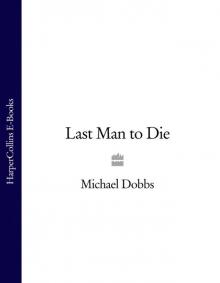 Last Man to Die
Last Man to Die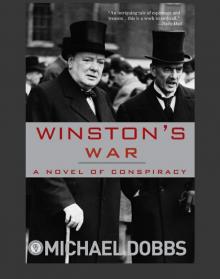 Winston's War
Winston's War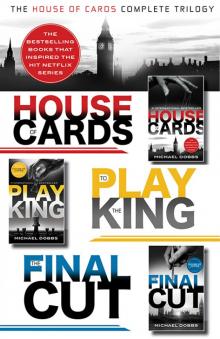 The House of Cards Complete Trilogy
The House of Cards Complete Trilogy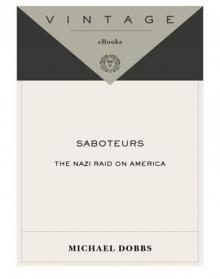 Saboteurs
Saboteurs The Touch of Innocents
The Touch of Innocents WC02 - Never Surrender
WC02 - Never Surrender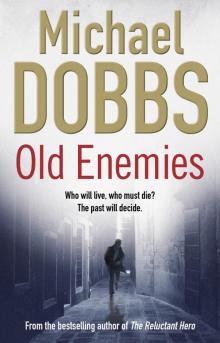 Old Enemies
Old Enemies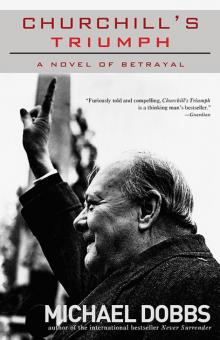 Churchill's Triumph
Churchill's Triumph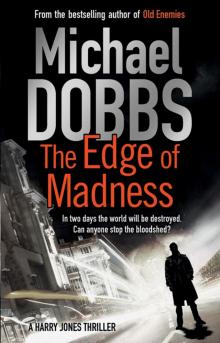 The Edge of Madness
The Edge of Madness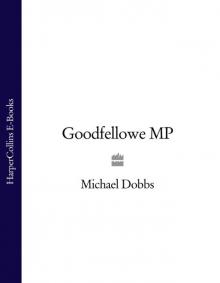 Goodfellowe MP
Goodfellowe MP The Final Cut
The Final Cut Whispers of Betrayal
Whispers of Betrayal Churchill's Hour
Churchill's Hour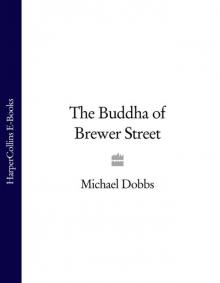 The Buddha of Brewer Street
The Buddha of Brewer Street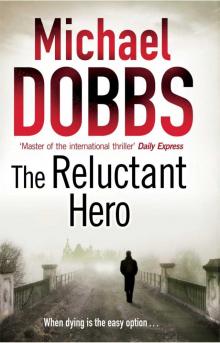 The Reluctant Hero
The Reluctant Hero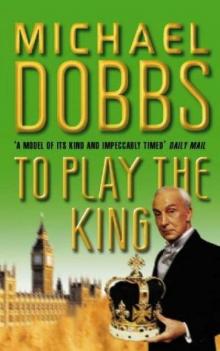 To Play the King
To Play the King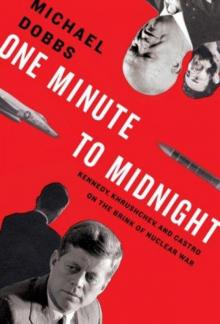 One minute to midnight
One minute to midnight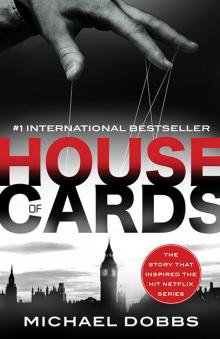 House of Cards
House of Cards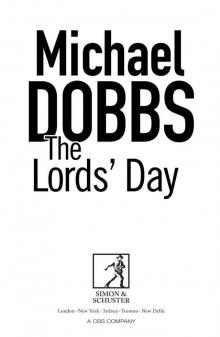 The Lords' Day (retail)
The Lords' Day (retail)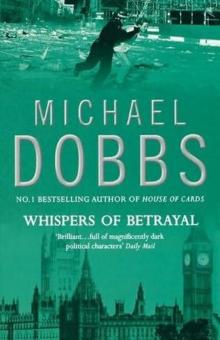 Whispers of betrayal tg-3
Whispers of betrayal tg-3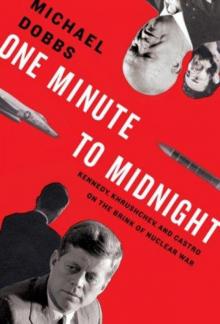 One minute to midnight: Kennedy, Khrushchev, and Castro on the brink of nuclear war
One minute to midnight: Kennedy, Khrushchev, and Castro on the brink of nuclear war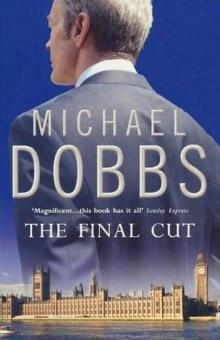 The Final Cut fu-3
The Final Cut fu-3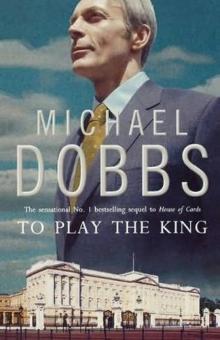 To play the king fu-2
To play the king fu-2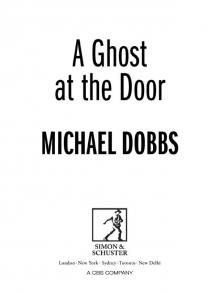 A Ghost at the Door
A Ghost at the Door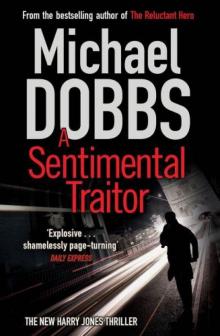 A Sentimental Traitor
A Sentimental Traitor